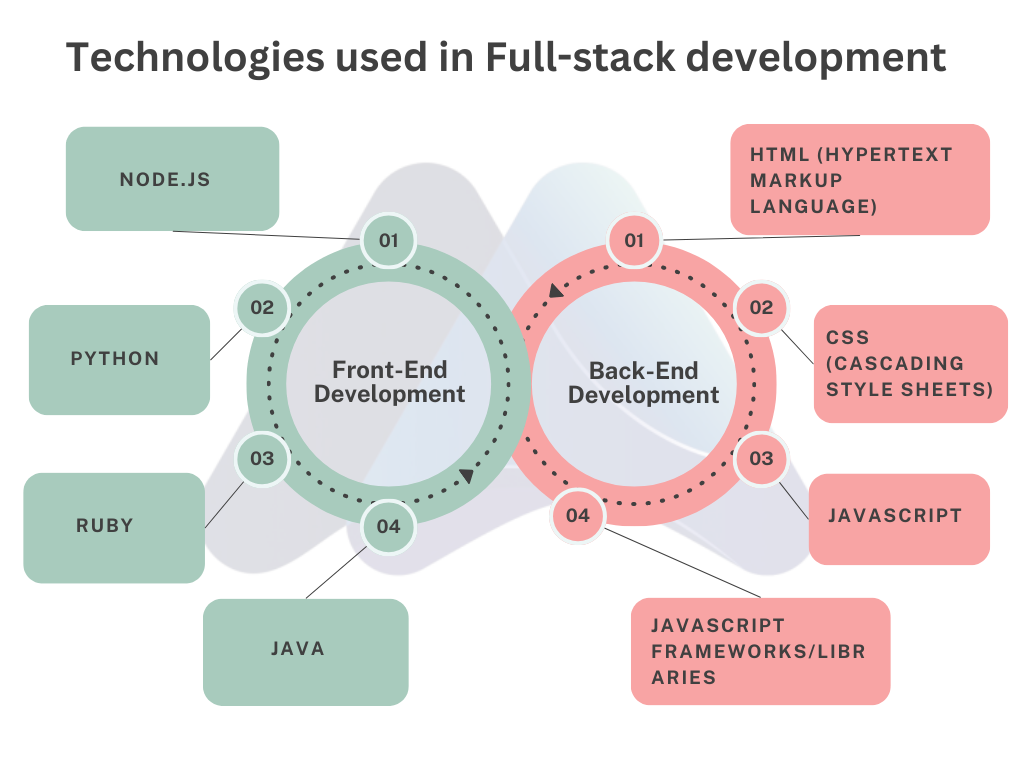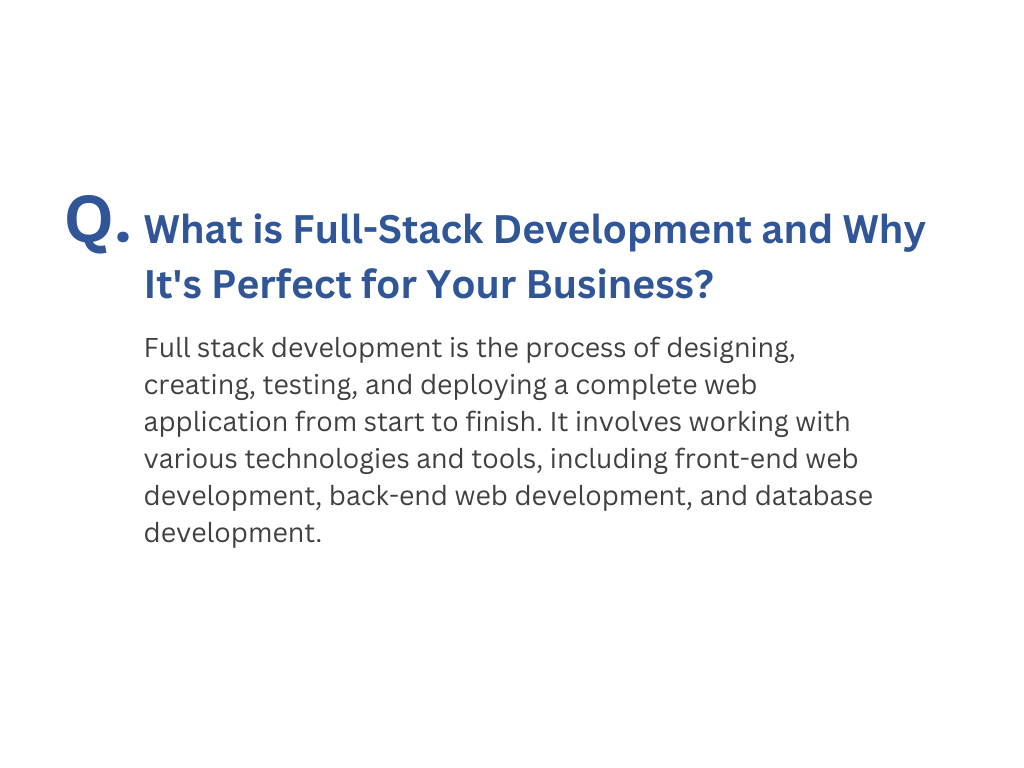What is Full-Stack Development and Why It’s Perfect for Your Business
In the current digital world, having a strong online presence is crucial to increasing reach. It also helps in achieving success for any business. Whether you’re just a start-up or an established enterprise, utilizing technology smartly and effectively can significantly impact your business growth and return on investment. Full-stack development is one such technological approach that has gained immense popularity. It is one of the helpful approaches to make you present anywhere at any time through the internet. You might be thinking about what is full-stack development, and why it is perfect for your business. So, with this detailed blog, we’ll get insight into the world of full-stack development and how it can benefit you and your business.
What is Full-Stack Development?
Imagine you’re building a house, so you hire various specialists for each work to make it strong and full of facilities. Everyone’s an expert in their field, but you might end up with a weak roof or a shower that sprays the entire bathroom if they don’t cooperate or communicate well with each other. Similar to this, you should hire experts for your web development, and proper cooperation is also crucial. In web development, there are two main components. Front-end development involves designing the visual part of a website or application, such as the buttons and menus you see when you visit any website or open any app. Then, back-end development involves building the unseen engine that makes everything work, like storing data and handling user interactions.
Full-stack development is the process of building both the front end and back end of a web application or software. In simple terms, it involves working on all parts and aspects of a project, from designing the user interface (UI) to implementing the server-side logic, coding with different programming languages, and database management.
For full-stack development, a company typically hires an expert referred to as a full-stack developer. These professionals are proficient in multiple programming languages and frameworks. They manage both customer/client-side and server-side development tasks, making them a crucial part of the full-stack development process. Full-stack developers are skilled and expert professionals in web/app development. They have the knowledge and experience to handle both the front-end and back-end aspects of building a website or software development.
Technologies used in Full-stack development
Full-stack development involves using various technologies to build both the front-end and back-end parts of web applications or software. Here is a list of some of the technologies that are typically used:

Front-end technologies include:
- HTML (Hypertext Markup Language): HTML stands for Hypertext Markup Language, and is the standard markup language. It is used to create the structure and content of web pages.
- CSS (Cascading Style Sheets): CSS, which stands for Cascading Style Sheets, is a tool that is used to give HTML elements a specific visual style. This includes things like layout, colors, and fonts.
- JavaScript: JavaScript is a programming language that is used to add interactivity and dynamic behavior to web pages. Front-end development relies heavily on JavaScript, allowing for important features such as form validation, animations, and client-server communication.
- JavaScript Frameworks/Libraries: There are several popular JavaScript frameworks and libraries that are commonly used in front-end development. These include React.js, Angular, Vue.js, and jQuery. These tools help developers streamline the development process, manage state, and create reusable UI components.
Back-end technologies include :
Several programming languages can be used for back-end development. Some examples include:
- Node.js: Node.js is a runtime environment that lets developers use JavaScript for server-side scripting, which means you can develop full-stack JavaScript.
- Python: Python is a programming language that is well-known for being simple and easy to understand. It is commonly used for back-end development.
- Ruby: Ruby on Rails is a popular web application framework called Ruby. It’s known for its convention over configuration approach, which helps make back-end development efficient and productive.
- Java: Java is a high-level, class-based, object-oriented language commonly used for building scalable and robust back-end systems, especially in enterprise environments.
- PHP: PHP is a popular server-side scripting language, often used for web development. It is commonly used when working with frameworks like Laravel and Symfony.
- Web frameworks: Web frameworks are tools that help developers in web application development in a structured way. They offer various features such as routing, middleware support, and database integration.
- Database Management Systems (DBMS): Database Management Systems (DBMS) are essential for storing and managing application data. Some popular relational database management systems (RDBMS) are MySQL, PostgreSQL, and Microsoft SQL Server.
Advantages of Using Full-Stack Development:
- Versatility: Full-stack developers can handle both front-end and back-end activities, which enables them to be versatile and adaptable to the requirements of a wide range of projects.
- Cost-Effective: Hiring a full-stack developer can be more cost-effective than hiring separate front-end and back-end specialists. This is because a single individual is capable of managing numerous elements of development.
- Quick Development: The development process will be more rapid when a single individual is in charge of the entire project. This streamlines communication, which in turn leads to faster development cycles and a shorter time to market for the product.
- Holistic Approach: Full-stack developers have a full understanding and knowledge of the entire development process, which enables them to make solutions that are cohesive and well-integrated.
- Problem-Solving Skills: Full-stack developers are experts in various technologies, which boosts their problem-solving abilities and enables them to make and try effective solutions to complicated challenges. Full-stack developers are recognized as the most skilled developers in the industry.
Why Full-Stack Development is a Perfect Fit for Your Business?
Now that you understand what is full-stack development and its benefits, let’s explore why it can be the ideal solution for your business:
- Streamlined Development Process: With a full-stack developer, you don’t need to manage separate teams for front-end and back-end development. This simplifies communication, reduces delays, and keeps your project moving smoothly.
- Improved Efficiency: Full-stack developers understand how all the pieces fit together. They can identify potential issues early on and troubleshoot problems more efficiently because they have complete knowledge of the development process.
- Cost-Effectiveness: Hiring one full-stack developer can be more cost-effective than hiring separate front-end and back-end specialists. This is an especially ideal option for smaller businesses or projects with a more limited budget.
- Greater Flexibility: Full-stack developers are adaptable and can wear many hats. They can jump in and handle whatever task needs attention, ensuring your project stays on track.
- Enhanced Project Ownership: Since full-stack developers work on both the front end and back end, they have a deeper understanding of the entire project. This fosters a sense of ownership and accountability, leading to a higher-quality product.
Factors to Consider While Choosing Full-Stack Development for Your Project?
While full-stack development offers numerous advantages, it can be an ideal solution for your business but you should hire them by evaluating your business requirements. Here are some factors to consider when choosing the perfect full-stack development for your project :
- Project Complexity: A full-stack developer might be perfectly suitable for smaller, less complex websites or software development. If you’re building the next-level digital media platform, hiring full-stack developers can be a helpful resource. They can be the perfect fit for a company website or a simple mobile app.
- Budget: Full-stack developers can be cost-effective, but their rates/prices vary depending on their experience and location. Consider your budget and evaluate the cost of a full-stack developer against the potential cost of hiring separate front-end and back-end specialists.
- Team Expertise: You might necessarily need a full-stack developer if you don’t have a team with strong front-end or back-end expertise. A full-stack developer can be a valuable asset as they primarily focus on every aspect of the development process. Their well-rounded knowledge can be a huge help in bridging communication gaps and ensuring a smooth workflow.
- Project Timeline: Full-stack developers can streamline the development process and speed up project completion. This is because there’s less handoff between teams, and a full-stack developer can quickly switch gears as needed.
Why choose full-stack developers from MLE Systems?
By choosing full-stack developers from MLE Systems, you’re investing in expertise, efficiency, and adaptability—all essential ingredients for a successful project.
- Faster Delivery: With a full-stack development from MLE Systems, you’re streamlining your development process. Fewer team members mean quicker communication and a faster turnaround time. Our developers excel at clear communication, reducing time and costs, and ultimately getting your product to market faster.
- Ideal for Small Teams and Start-Ups: In the fast-paced world of start-ups and small teams, rapid prototyping within tight budgets is crucial. Our full-stack developers thrive in these environments. They’re self-organized, flexible, and efficient, bringing value through collaborative work and creative problem-solving.
- All-Rounder Individuals: Forget hiring separate teams! Our developers are experts in both front-end and back-end, handling everything your web project needs. From back-end technologies like Node and Python to front-end technologies like HTML and JavaScript, they handle it with ease. Their proficiency extends to website, web app, and mobile app development, along with expertise in DevOps, databases, and server management.
- Time and Cost Reduction: Efficiency is key in saving on both time and cost. Our developers are efficient problem-solvers, keeping your project on track and reducing costs. Our developers optimize website and web app performance while minimizing personnel, management, and infrastructure expenses. With their broad skill set, they can develop quickly and troubleshoot effectively, saving you time and money in the long run.
- Flexibility and Adaptability: Your project’s needs may evolve, but our full-stack developers are ready to adapt. Whether it’s scaling up your development team or expanding the project scope, they seamlessly adjust to your changing requirements. You stay in control while they ensure the development process stays on track.
Conclusion
Full-stack development offers a range of flexible solutions for businesses, especially those with smaller projects or limited budgets. Its ability to handle both front-end and back-end development promotes streamlined communication, improved efficiency, and greater project ownership. However, the ideal development approach depends on your project’s specific needs. Consider the complexity of your project, your budget, your existing team’s expertise, and your desired timeline when making your decision.
If you are looking for full-stack development or do you have a web development project in mind? Consult expert developers of the MLE System to determine the best approach for bringing your web vision to life and boosting your business. Whether you need a simple website or a complex application, our full-stack developer can be a valuable asset to your team.
“Websites promote you 24/7: No employee will do that.” – Paul Cookson

